Re: Please help ... French Tarot dates 1500 - 1659
41Yes, I forgot about that, my apologies. Well, the rest of it might somehow be of interest.
Later I added to the same topic:Andrea Vitali recently published ...
Ludere ad Triumphos
Cum Deo et in Ecclesia
http://www.letarot.it/page.aspx?id=281&lng=ITA
It contains two new notes about the Trionfi game ...
******************************
1.
One of the notes relates to Gabriel Barletta, about whom Ross already has worked, though in other contexts, as far I perceive it.
( viewtopic.php?f=11&t=321&p=4011&hilit=barletta#p4011 )
The important passage in Andrea's text is ...
Si vult venire in domum meam in istis festis paravi plura. Si voluerit ludere ad triumphos sunt in domo; ad tesseras, habeo plura tabularia. Ad Occam, habeo taxillos grossos, & minutos: grossos ut si fortè male videret,
... which seems to be from Barletta. Barletta's last known note of his life is from 1481, the original text has no date.
The referencing text is Récréations Historiques, Critiques, Morales et d’Èrudition avec l’Histoire des Fous en Titre d’Office, published at Paris in 1767.
I found the French text here:
http://books.google.com/books?id=DINgZL ... 22&f=false
... but Andrea noted, that the first publication of the special sentence appeared 1497 (Sermones quadragesimales et de sanctis). Andrea noted privately "... probably from 1480".
In a later private discussion with Andrea it turned out, that the mentioned "Occam" and "Aucam" game (which first puzzled us) was nothing else but the Goose game (a running game). Well, if my French would have been better, I would have noticed this likely earlier.Added later:
http://www.rabelais.nl/html/in_geschrifte.htmlAt this partly Dutch page, it seems, that the sentence was used in a modified manner by Rabelais ... one of the modifications is the change of "Occam" to "aucam".‘Bridoye et le jeu de l’oie’
‘On joue beaucoup aux dés chez Rabelais. Gargantua s’y exerce dès l’enfance, Panurge ne saurait vivre sans. Mais à quoi? Au jeu de l’oie? L’épisode de Bridoye y invite mais les historiens sérieux de ce jeu, ceux qui ne le croient ni renouvelé des Grecs, ni égyptien semblent formels. Aucun jeu de l’oie antérieur aux dernières années du seizième siècle n’est conservé. Pourtant, le dominicain italien Barletta (= 1480), dans un sermon pour le quatrième dimanche de l’Avent, parle du jeu de l’oie à cette période de Noël, plus même, il y faut des gros et des petits dés afi n de remédier aux imperfections de la vue dues à la sénescence. Ce texte est, on le sait, paraphrasé par Rabelais: “Sed dicunt quidam. Si vult venire in domum meam in istis festis, paravi plura. Si voluerit ludere at triomphos (tarot) sunt in domo, ad thesseras habeo plura tabulatia, ad aucam habeo taxillos grossos et minutos. Grossos ut si forte male videret, qui a deus senuit”.
Le texte est édité à Brescia en 1497-1498, à Lyon dès 1502, 1507, 1524…
Changes to Andrea's version:
Si vult venire in domum meam in istis festis paravi plura. Si voluerit ludere ad triumphos sunt in domo; ad tesseras, habeo plura tabularia. Ad Occam, habeo taxillos grossos, & minutos: grossos ut si fortè male videret [missing: qui a deus senuit, but for Andrea follows "Quia Deus senuit:"]
But the half-Dutch text itself seems to go back to this pdf ...
http://193.52.215.193/cinquantenaire/Ma ... mes1_1.pdf
Author is Claude Gaignebet, if I see this correctly ...
http://www.francoisrabelaislefilm.com/e ... nebet.html
... with some involvement in a Rabelais movie project. And also Tarot ...
Movie : http://www.wat.tv/video/claude-gaignebe ... gnjr_.html
So far this seems clear. But an open question is, where and how Rabelais quoted Barletta. Maybe it's one of the oldest French Tarocchi notes (as as such would belong to this list) or it includes the older form "Trionfi" in a French variant? Or do I still misinterpret the text and the passage of Claude Gaignebet says NOT, that Rabelais took something of Barletta, but it just appeared as Barletta's text in Latin in Lyon in the years 1502, 1507, 1524 ... even this would testify the term "Triumphos" in France - printed in Lyon - and as such it would be the fourth we know of after Marcello's letter 1449, the dictionary note of 1480 and the card playing bills of Rene II d'Anjou in the 1490s, though not in French language.Some internal communication cleared the question, that the Occam word of Andrea's source and the "aucum" word of Rabelais both likely refer to the "Gioco dell'oca" ...
http://it.wikipedia.org/wiki/Gioco_dell%27oca
... the Goose game, well known already in 15th century Italy and very earlier.
First it was suspected, that there might have been possibly a game related to William Ockham ... :-) ... also spelled Occam occasionally.
Compare:
http://www.scribd.com/doc/50404340/Jose ... n-francais
at page 25
aucam > oie (et ove ... ?)
French oie, German Gans, English Goose, Italian Oca
Original at http://193.52.215.193/cinquantenaire/Ma ... mes1_1.pdf
Claude Gaignebet (Université de Nice)
cleogauthier "at" yahoo.fr
Bridoye et le jeu de l’oie
On joue beaucoup aux dés chez Rabelais. Gargantua s’y exerce dès l’enfance, Panurge
ne saurait vivre sans. Mais à quoi ? Au jeu de l’oie ? L’épisode de Bridoye y invite
mais les historiens sérieux de ce jeu, ceux qui ne le croient ni renouvelé des Grecs,
ni égyptien semblent formels. Aucun jeu de l’oie antérieur aux dernières années du
seizième siècle n’est conservé. Pourtant, le dominicain italien Barletta (= 1480), dans
un sermon pour le quatrième dimanche de l’Avent, parle du jeu de l’oie à cette période
de Noël, plus même, il y faut des gros et des petits dés afi n de remédier aux imperfections
de la vue dues à la sénescence. Ce texte est, on le sait, paraphrasé par Rabelais :
« Sed dicunt quidam. Si vult venire in domum meam in istis festis, paravi plura. Si voluerit
ludere at triomphos (tarot) sunt in domo, ad thesseras habeo plura tabulatia, ad aucam habeo
taxillos grossos et minutos. Grossos ut si forte male videret, qui a deus senuit ».
Le texte est édité à Brescia en 1497-1498, à Lyon dès 1502, 1507, 1524…
Cette petite pierre à la surface de la mare tranquille des lectures de Rabelais irradie des
cercles concentriques d’autant plus hypothétiques qu’ils s’éloignent du centre. Mais
les Silènes alcibiadiques masqués d’oisons bridés et de canes bâtées invitent à…
Reprendre la voie des signes (3 multiplié par 3) qui, de 9 en 9, marque les étapes
de la quête des cornes de Panurge au Tiers livre.
Reconnaître dans le 4 pris pour un 5 de Bridoye le désir de parvenir en 53, au
grand dépit de Toucheronde (le pion adverse).
Compter à la façon du Timée les 1+2+3+4= 10 de la tétrade des consultants pour
parvenir à 63 et gagner l’oie.
Relire sur ce point les commentaires au Timée de Procle et de Chalcidius où
l’on s’interroge sur l’identité du mystérieux quatrième absent que Jamblique
estime « supérieur aux présents et contemplateur des intelligibles ».
S’aventurer à énumérer les caractéristiques aucines des héros du roman :
Panurge rôti, mangeant son blé en herbe, honorant Némésis, la déesse oie de la
Fortune dont le lieu est l’oreille dextre (Pline), oyant et merdoyant.
Badebec ; Gargantua, car gantes et gantuas sont oies médiévales (Du Cange).
Trouillogan, l’oie-truie ou la merde d’oie, selon que l’on choisisse l’une ou
l’autre étymologie d’un obscur « trouille » (Von Wartburg), bien proche du
pourceau volant à pattes d’oie de l’esprit tutélaire de la gigantale race andouillique.
Og-hapalit, le géant pré-déluvien (cf. Du Cange, s.v. « oga « = oie= oge).
you can discard this one, as it is simply a typo which doesn't appear in earlier editions, the oldest I found(1595) reads "tArot" (I capitalize) at the same place.Huck wrote: double page . 51 .... Torot
Thanks.Bertrand wrote:Hello,you can discard this one, as it is simply a typo which doesn't appear in earlier editions, the oldest I found(1595) reads "tArot" (I capitalize) at the same place.Huck wrote: double page . 51 .... Torot
Bertrand
... there's a transcription of Hans-Joachim Alscher1659. Paris. Taros (Maison Academique des Jeux)





Si ce Ieu de Cartes de Taros n'a pas esté mis plutost en lumiere dans nostre France, c'est comme ie croy que les François ne demandent que l'abregé de toutes choses: & ce qui fait qu'il n'a pas eu grand cours, c'est que tres peu de personnes ont la connoissance des regles qu'il y faut obseruer pour y ioüer, lequel ieu est le plus diuertissant qui se puisse trouuer dans toute sorte de ieux, & duquel ie puis dire auec verité, qu'il n'y a aucune fourberie, ny filouterie: Les Suisses & les Alemans ne ioüent point ordinairement à d'autres ieux, & mesme en France, comme à Lyon, Marseille, & autres lieux oú ils ont connoissance de la gentillesse de ce Ieu, dans l'obseruation des regles qui suiuent pour vous en donner la connoissance.











Thierry said in Tarot: jeu et magie (1984), p. 67, that the 1654 edition of Maison Academique only had two card games, Piquet and Hoc. The 1659 edition was greatly expanded, and included Tarot for the first time.Huck wrote: I don't know, if there's a big difference to a 1654 version. Actually I would like to know, what's the difference between the rules of 1637 (Marolles) and those of 1654.
Are these the same texts? Are they different? And where had the text of the 1637 version been found, if it is not identical to the version 1654?
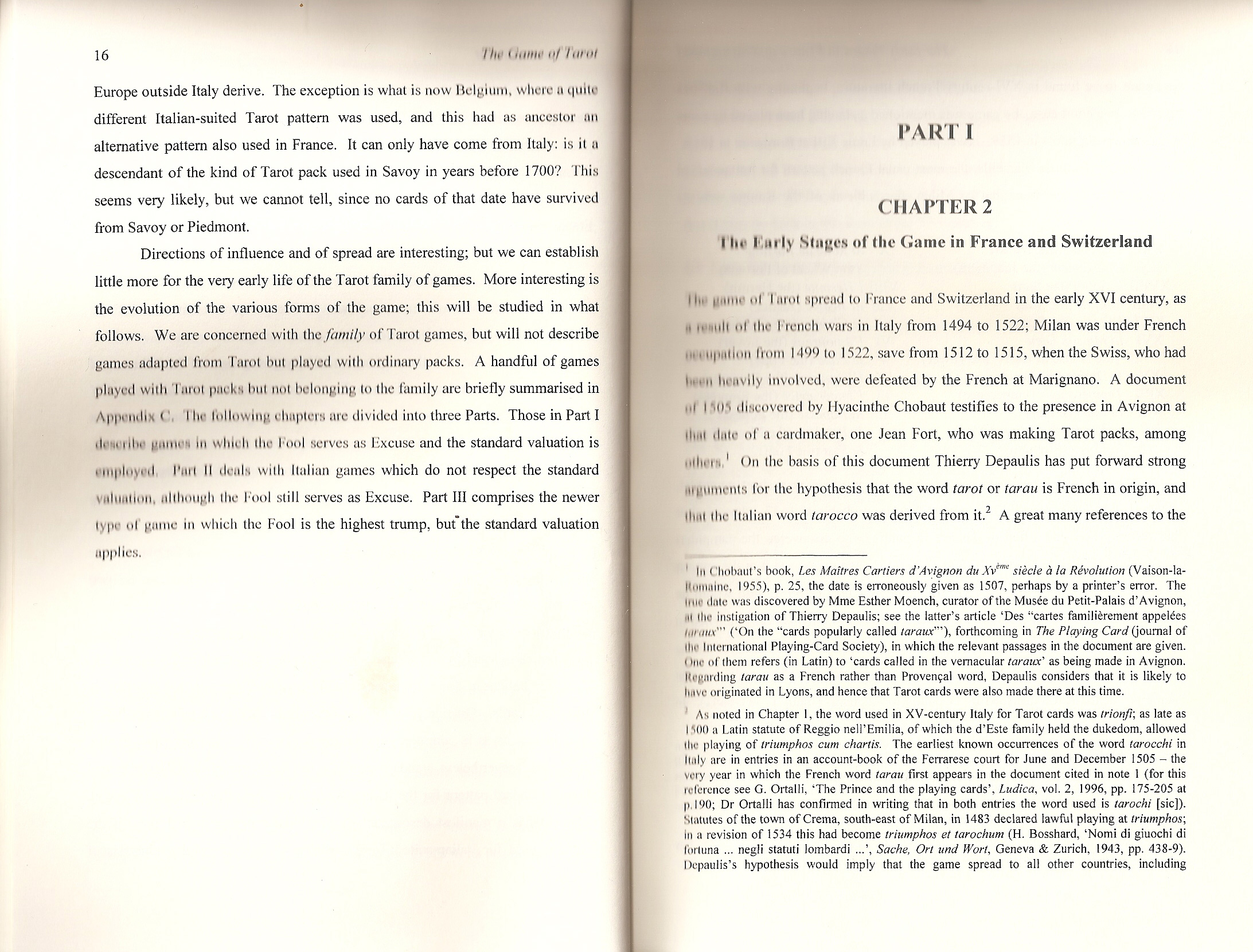
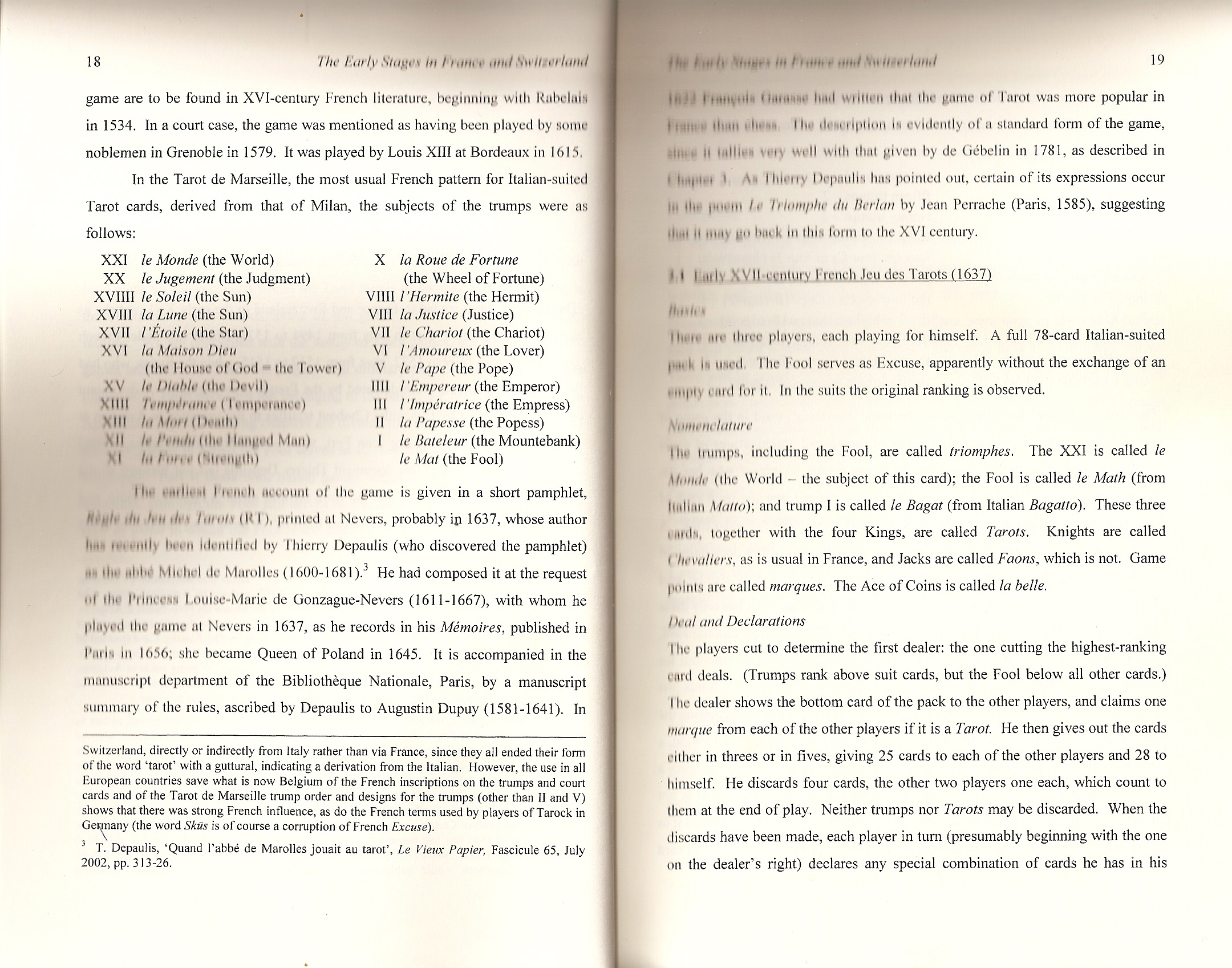
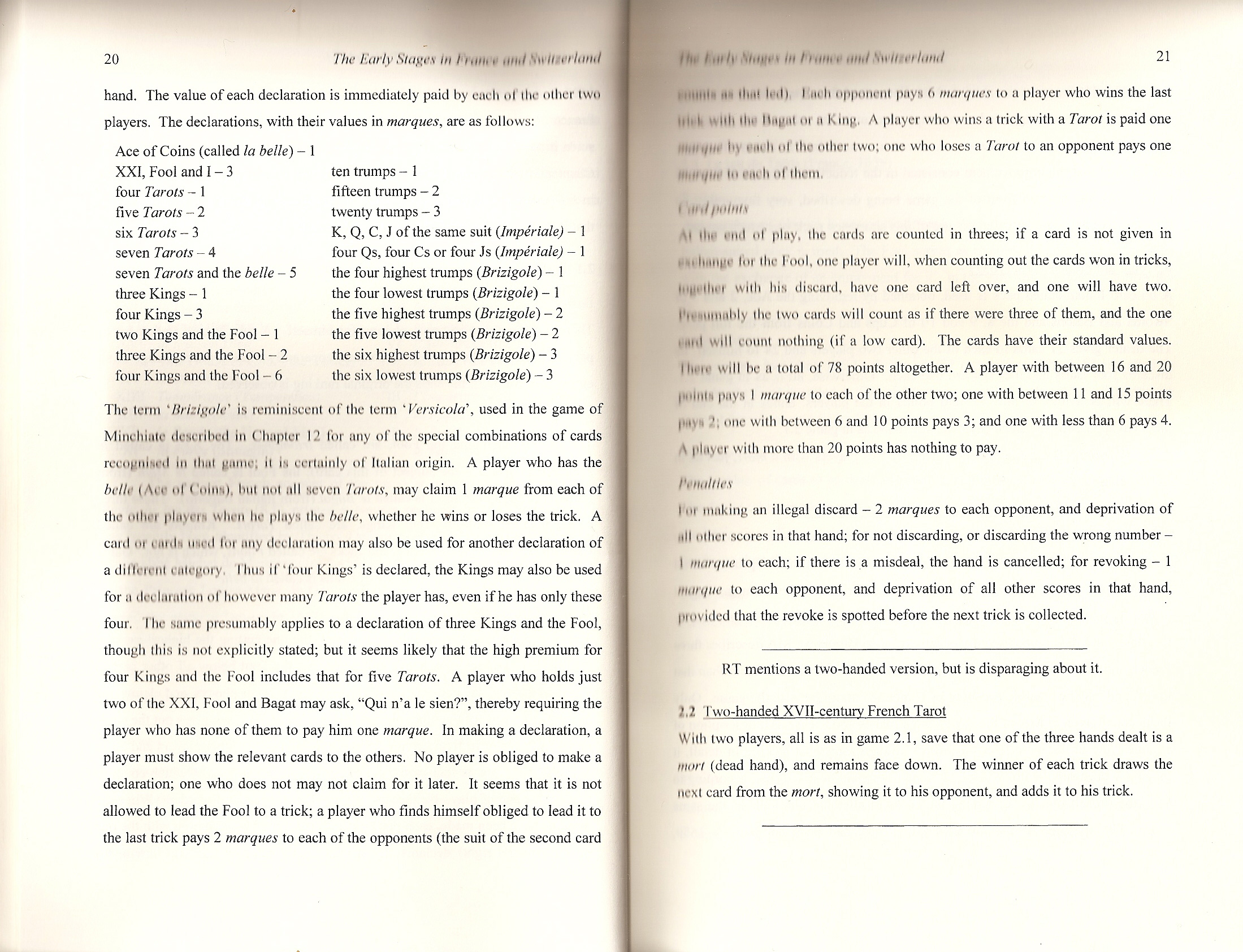
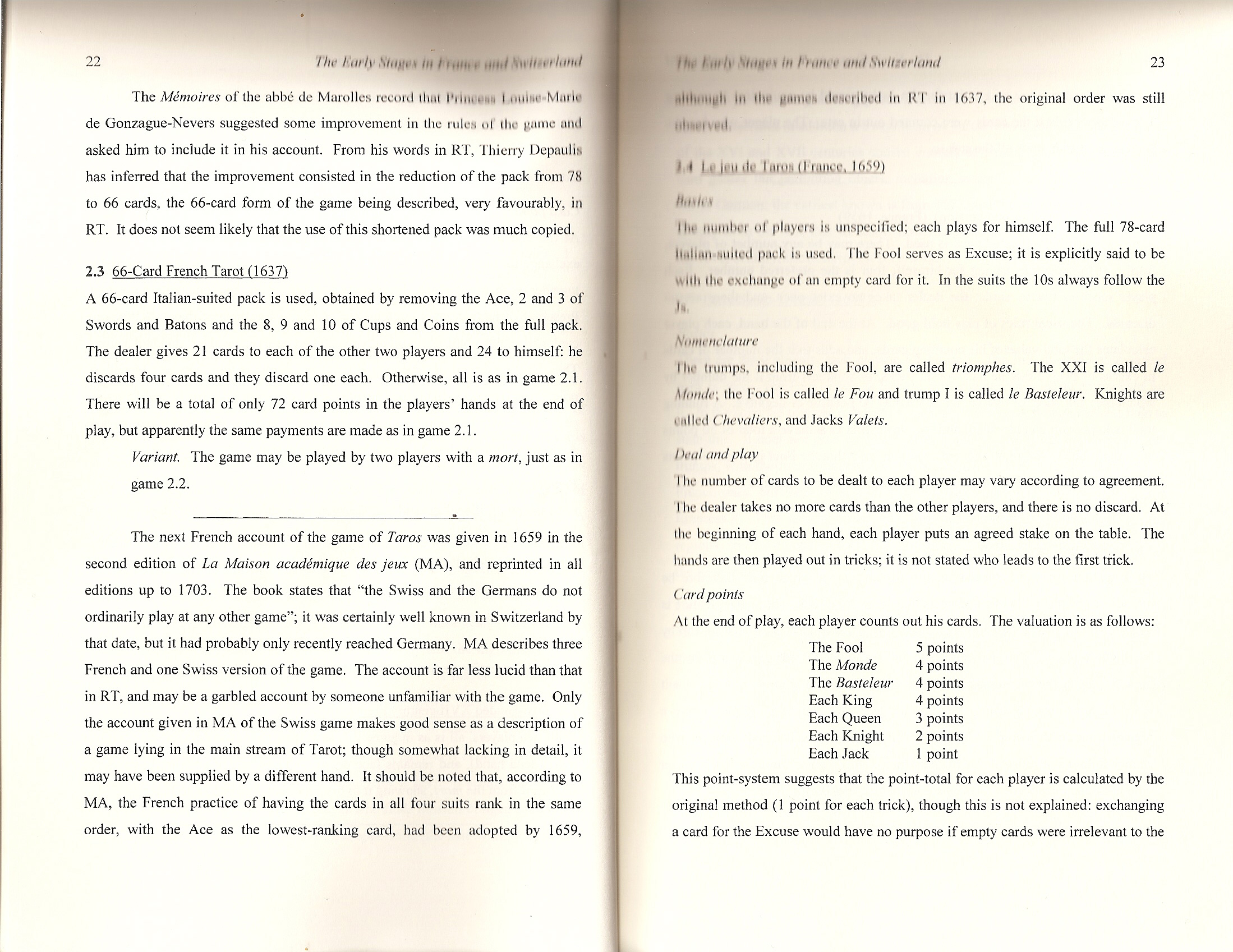
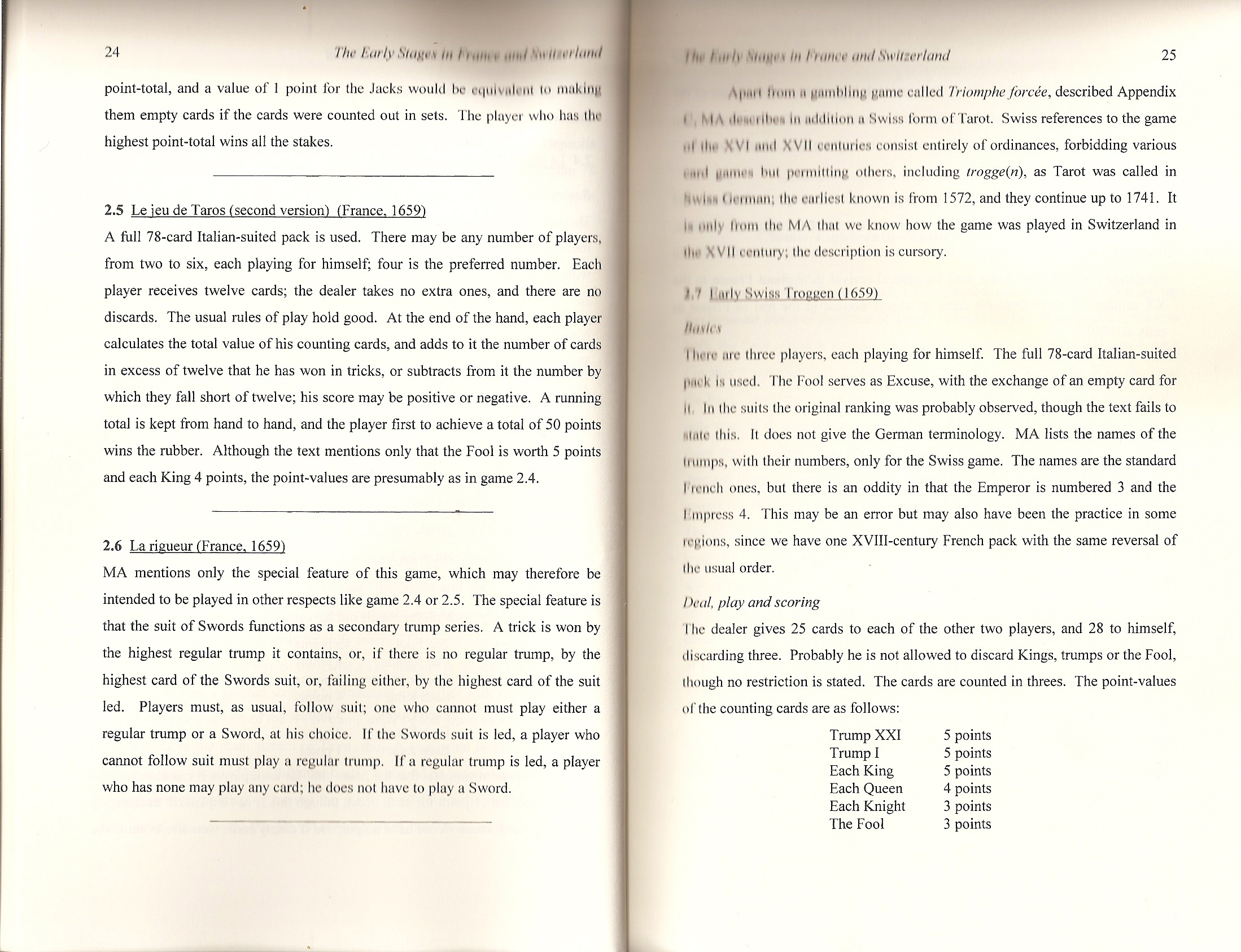
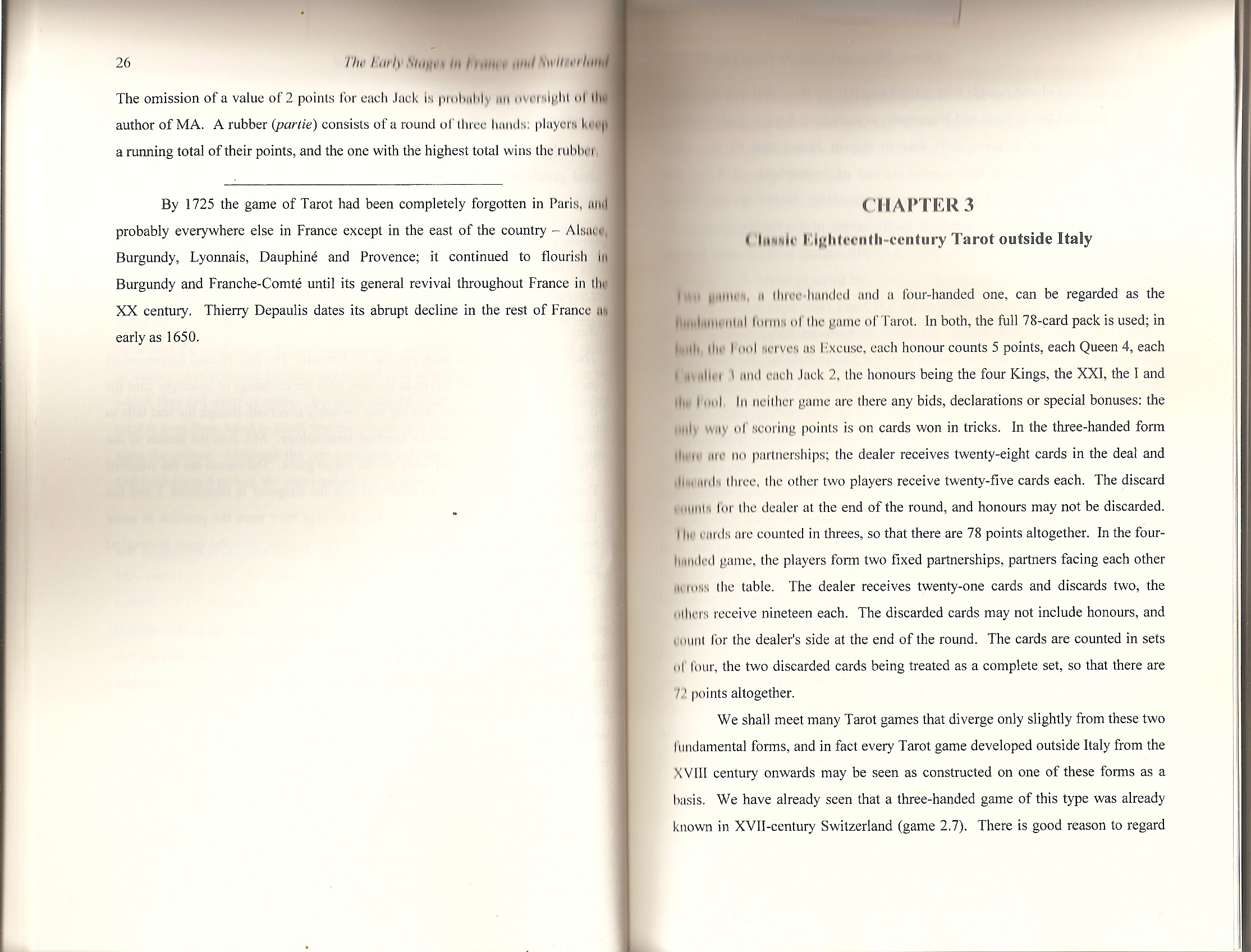














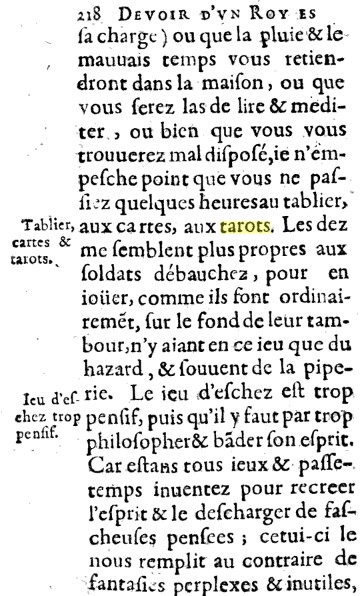
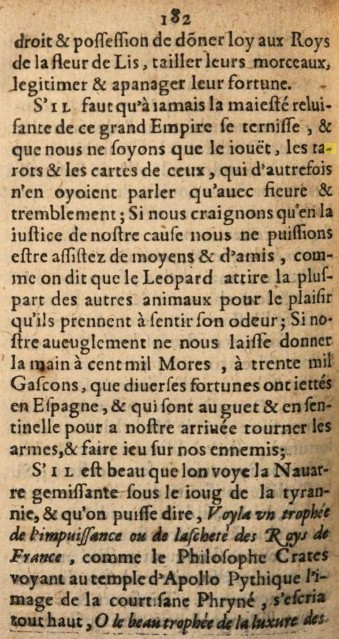
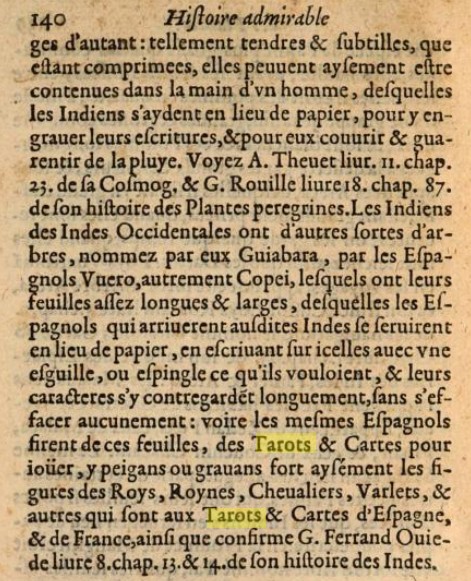
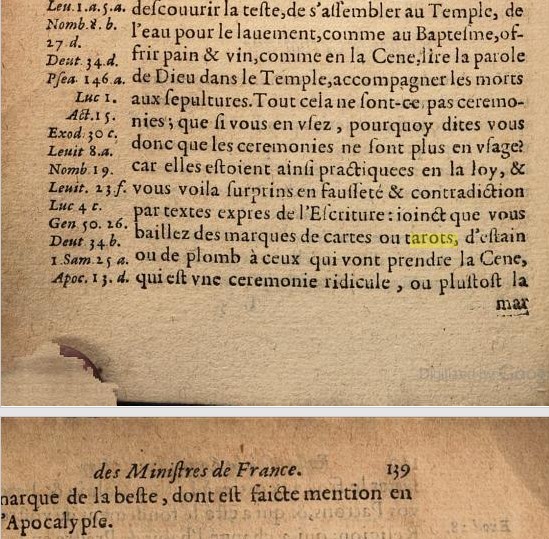

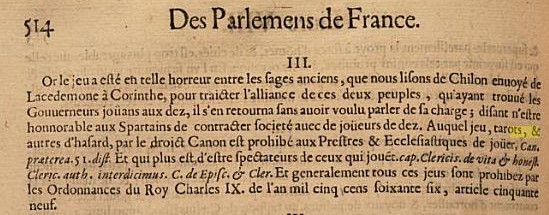

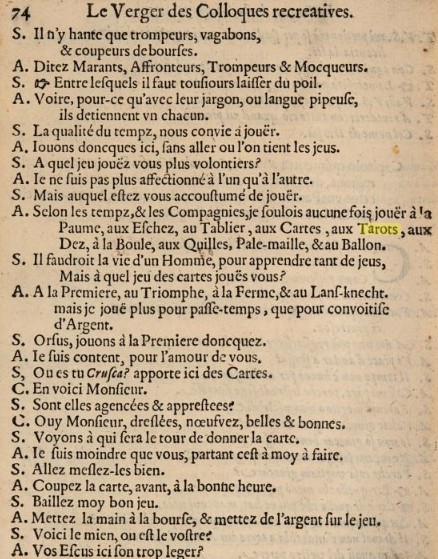
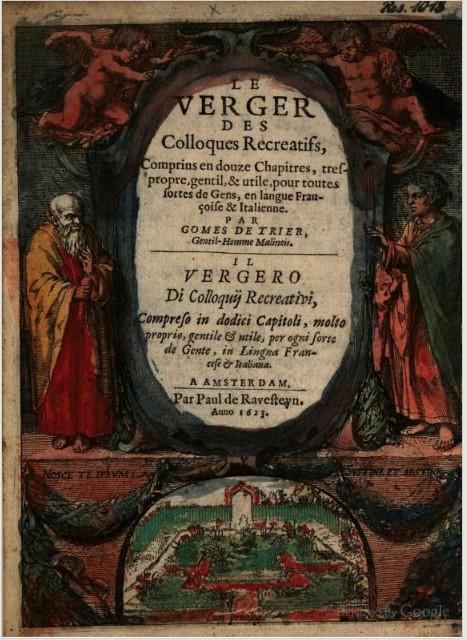

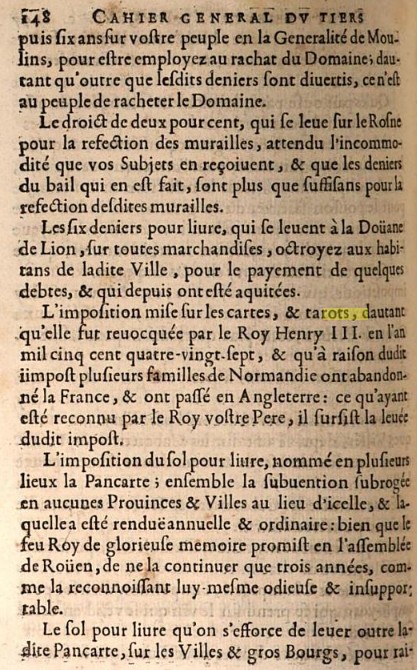


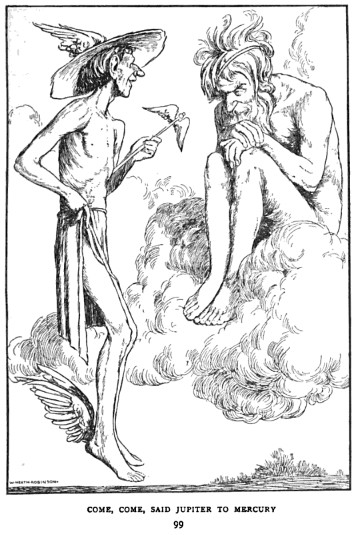

Tarot was definitely popular and often quoted even if out of context.Huck wrote:GOOGLE says, it has about 446 results on "Tarots" between 1600-1650, but gives only 100 results. From these maybe 50% might be errors, these are more often presented in the second half of the 100 (so, if it really would present its 446 results, it might be much more than 50% errors, if it would give 446 results). Nearly all of the findings are one-time-notes of "Tarots" in the book. I collected some of the positive results (not all of them, and most are not very interesting, are doublettes, etc.)
basically it says that Spanish found the "Indians" used some leaves as paper, and that after the Spanish used said leaves to make playing cards, so Tarot is cited as an example of cards.I found this curious, why the game of Tarot appeared in a book about plants. I remembered, that some French playing cards had plants as motifs. Were there also Tarot cards with plants?
tax on playing cards and tarots.Just a later edition of an earlier text. Something happened with king Henry III in 1587. Somehow Tarots seem to have played a (minor ?) role.
probably taxesDéclaration touchant la fabrication des cartes à jouer, tarots et dés.
France, Louis XIV (roi de France)(1661)
http://books.google.de/books?id=rTZqQwA ... edir_esc=y
no preview
Might be important.
taxes again.La chorographie ou description de Provence, et l'histoire chronologique du même pays
Honoré Bouche, C. David, 1664 ... the passage reports the year 1660
This might have influenced the situation of Marseille.
Well, the thread has the idea to collect material useful to get a clear picture (with documentation and easy access of the documents according to the new possibilities of the web) of the French Tarot development. If I would have the idea (and the knowledge), that this material wold be presented somewhere else in satisfying manner, I would simply and immediately link to it. I wouldn't take the work on it. But I don't know such a place. If anybody knows it better, please show, where it is ...Bertrand wrote:Hello
as usual Huck a bit too mixed and long !
"It was popular" is not a very clear description, especially, when the popularity wasn't always of the same quality.Tarot was definitely popular and often quoted even if out of context.Huck wrote:GOOGLE says, it has about 446 results on "Tarots" between 1600-1650, but gives only 100 results. From these maybe 50% might be errors, these are more often presented in the second half of the 100 (so, if it really would present its 446 results, it might be much more than 50% errors, if it would give 446 results). Nearly all of the findings are one-time-notes of "Tarots" in the book. I collected some of the positive results (not all of them, and most are not very interesting, are doublettes, etc.)
tax on playing cards and tarots.Just a later edition of an earlier text. Something happened with king Henry III in 1587. Somehow Tarots seem to have played a (minor ?) role.
Yes, of course. But maybe there are indications, that taxes on tarot cards were increased against taxes in other times?probably taxesDéclaration touchant la fabrication des cartes à jouer, tarots et dés.
France, Louis XIV (roi de France)(1661)
http://books.google.de/books?id=rTZqQwA ... edir_esc=y
no preview
Might be important.
taxes again.[/quote]La chorographie ou description de Provence, et l'histoire chronologique du même pays
Honoré Bouche, C. David, 1664 ... the passage reports the year 1660
This might have influenced the situation of Marseille.
http://www.marseillais-du-monde.org/his ... _mars.php3Fort Saint-Nicolas was constructed at the same time [1660] on the opposite side of the harbour. Commenting on their construction, Louis XIV said, "We noticed that the inhabitants of Marseille were extremely fond of nice fortresses. We wanted to have our own at the entrance to this great port." In fact, the two new forts were built in response to a local uprising against the governor, rather than for the defence of the city: their cannons pointed inwards towards the town, not outwards towards the sea.
Marseille in 1659 is called beside Lyon a city, which had some Tarot enthusiasm (if I understood this correctly).1650 : Coup de main des partisans d’Antoine de Valbelle qui reprend l’Hôtel de ville. Ils accueille le représentant du roi et gouverneur de la Province, le comte d’Alais, à coup de mousquet. L’administration du commerce devient séparée de celle de la ville, en particulier au niveau du budget.
1653 : Au plus fort de la Fronde, Valbelle et ses partisans gardent Marseille fidèle au roi Louis XIV, mais ne considèrent pas que la ville fasse partie intégrante du royaume, en particulier sur la plan de la fiscalité.
1655 : Mort d’Antoine de Valbelle. Marseille passe aux mains de Lazare de Vento, tenant du parti opposé (parti des princes).
1658 : Les marseillais se révoltent contre Lazare de Vento, qui fuit. Aux élections du conseil de ville qui suivent, l’ancien parti de Valbelle revient au pouvoir en la personne de Gaspard de Glandevès, sieur de Niozelles, mais les élections sont annulées par Louis XIV.
1659 : Traité des Pyrénées. Nouvelle élection des amis de Niozelles à Marseille. Un document signé par le roi est lacéré. La ville est pratiquement interdite aux autorités légitimes.
1660 : Siège de la ville par les troupes royales. Marseille se rend. Louis XIV fait détruire la porte principale et pénètre symboliquement dans la ville par la brèche qu’il a fait ouvrir dans le rempart. Réforme des institutions municipales. Les représentants du commerce récupèrent le pouvoir local et Niozelles et ses amis sont déclarés coupables de lèse-majesté. Tutelle administrative. Construction des forts Saint-Nicolas et Saint-Jean pour protéger les garnisons royales contre les marseillais, ce qui fait de Marseille une place forte. En quittant la ville, Louis XIV y laisse une garnison. Marseille pert son autonomie mais la cité va désormais sortir de ses limites antiques.

Lyon had been of importance for the money system. "75 banques italiennes en 1568" likely explain, why Lyon was GREAT in matters of Tarot, beside the features, that it was also a playing card producing city an that it wasn't far from Italy. And it had lots of connections to Florence already in second half of 15th century.Les conflits religieux entament largement l'économie lyonnaise, qui ne retrouve pas son prestige par la suite. La plupart des imprimeurs émigrent à Genève. Les grandes familles bancaires fuirent Lyon pour n'y jamais revenir (75 banques italiennes en 1568, 21 en 1597)n 1. Lyon est redevenue, à l'orée du XVIIe siècle, une cité de moyenne importance.
No doubt that Lyon was of great importance, not only in matters of Tarot but mostly also for the printers, which were maybe in some way linked to cardmakers - as far as I know (very little) there are some evidences or hints but this relationship has not been thoroughly studied yet. This could also have an important role in the circulation of tarots.Huck wrote:Lyon had been of importance for the money system. "75 banques italiennes en 1568" likely explain, why Lyon was GREAT in matters of Tarot, beside the features, that it was also a playing card producing city an that it wasn't far from Italy. And it had lots of connections to Florence already in second half of 15th century.
Yes, I see the problem. But there's not only the reader, but also the writer. And the state of "collection" is not the final state, it's just the note book. One finds something, and one must save it somewhere. If I save it in my computer I've the better chances to forget about it. If I put it in the forum, perhaps somebody has something of it ... at least I remember it better myself, and even if I forget about it, I've the better chances to stumble about it at some opportunity.Bertrand wrote:Hello,Huck wrote: Sorry about the beginning of my earlier post which wasn't meant to be offensive, it's simply that the amount of unsorted images and quotes make it difficult to follow (and reply) especially when someone is not a native english speaker - so maybe you could post different unsorted stuffs to different threads, and maybe wait to have a wider picture and an understandable purpose before posting them because this way I simply can't follow clearly the discussion nor the point of filling a thread with random findings (and maybe I'm the only one who minds about that ;) )
Bertrand